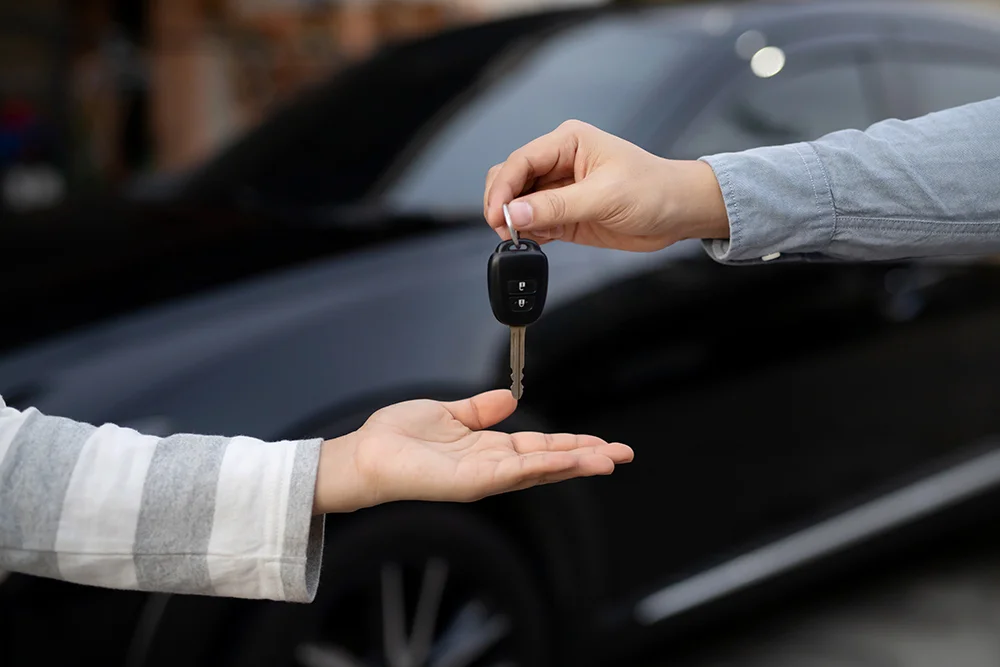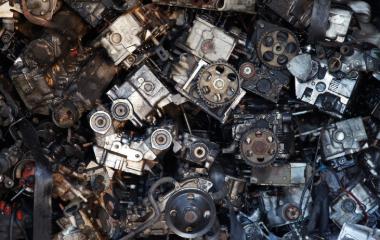Compare the best ways to sell your car for the most cash in Queensland
Selling a car can feel like a big task, but with the right approach, it’s simpler than you think. Whether your car is in great condition or on its last legs, there are plenty of ways to get a good deal. From prepping your car to understanding the local legal requirements, our guide will walk you through each step to make the process smooth and hassle-free. You'll also discover how to avoid common pitfalls and get the best possible price.
What we’ll cover:
- Tips for getting your car ready for sale
- How to sell privately, to a dealership, or to salvagers like 1800 Salvage
- Legal must-knows, including safety certificates and paperwork
- Why choosing the right method will maximise your return
If you're looking for the best way to sell your car in Queensland, keep reading for practical advice tailored to your needs. Or get started with our cash for cars Brisbane service for a head start today!
The best ways to sell your car in Brisbane
Understanding your selling options is key to making the right decision. Whether you’re in a hurry or seeking the best price, it’s important to weigh your options carefully. We’ve written more comprehensively about where to sell your car in Brisbane, but here’s a quick summary of what you need to know now:
Selling privately
Selling your car privately can often yield a higher price, as you have control over the entire process, including setting the price and negotiating with buyers. It usually involves advertising the vehicle on platforms like Gumtree, Facebook Marketplace, or Carsales, where potential buyers will contact you directly.
However, selling privately can also be time-consuming. You'll need to prepare the car, take high-quality photos, write detailed descriptions, and field inquiries from potential buyers. Additionally, you may need to organise meetings for test drives and negotiate the final price.
Selling privately comes with some clear benefits and downsides. Here’s what you should consider:
- Pros:
- Potential to receive a higher price since you set the terms of the sale.
- No need to split profits with a middleman or dealership.
- Cons:
- Time-consuming process with advertising, responding to inquiries, and managing viewings.
- Higher risks when dealing with unknown buyers.
Selling to a dealership
Selling your car to a dealership is a fast and convenient way to offload your vehicle, especially if you're looking to avoid the hassles of private selling. Most dealerships offer a straightforward process: you bring in your car, they inspect it, and you walk away with an offer on the same day.
While this method is hassle-free, dealerships typically offer a lower price than private buyers. Dealerships need to resell the car for a profit, so they often won't offer the highest price for your vehicle. It’s a good option if you're in a rush and value convenience over maximising profit.
Before choosing this option, here’s what you should weigh up:
- Pros:
- Fast and easy process with same-day offers and payments.
- No need to manage listings, inquiries, or negotiations.
- Cons:
- Usually results in a lower price compared to selling privately.
- Limited room for negotiating the final offer.
Selling to car removal or salvage companies
If your car is damaged, undriveable, or simply not worth the trouble of selling privately, car removal services like 1800 Salvage are a great option. They specialise in purchasing junk or non-roadworthy cars, offering free towing services and paying cash on the spot for your vehicle, regardless of its condition.
Car removal services are particularly useful for cars that no longer run or would be too costly to repair. It’s a fast, hassle-free way to dispose of your car without worrying about preparing it for sale or dealing with potential buyers.
This option offers convenience but may not always fetch the highest price:
- Pros:
- Quick and hassle-free, with free towing and immediate cash payments.
- Ideal for non-running or heavily damaged cars.
- Cons:
- Lower potential value than selling privately or to a dealership.
- May not be suitable for newer or well-maintained cars.
Price isn’t the only critical factor — time is always of the essence, too. Let us teach you a bit more about how long it takes to sell a car in Brisbane.

Preparing your car for sale
To ensure you get a fair price for your vehicle, it’s important to prepare thoroughly before selling. For scrap cars, it can be helpful to know the current market value of your vehicle. We can teach you much more about how much your scrap car could be worth in Brisbane, but in the meantime, here are the critical basics you need to know:
What documents do you need to sell your car?
Before selling your car, it’s essential to gather all necessary documents to ensure a smooth transaction. These include proof of ownership, registration papers, and any other relevant records that show the car’s history. A Safety Certificate (RWC) is also crucial in Brisbane if you’re selling a registered vehicle privately, as it verifies that the car meets basic safety standards.
Having all your documents in order reassures buyers and helps speed up the sale. In addition to the RWC, providing service records can show how well-maintained the vehicle is, potentially increasing its value.
Documents checklist:
You’ll need the following documents ready before listing your car:
- Proof of ownership: This can be the car's registration papers or any official document showing your ownership.
- Safety Certificate (RWC): Required in Brisbane for selling a registered car.
- Service records: These demonstrate that the car has been properly maintained, which can help boost buyer confidence.
Cleaning and repairing your car
A clean, well-presented car can significantly improve your chances of selling and may help you get a better price. Spend some time thoroughly cleaning both the interior and exterior, as first impressions are crucial. This involves washing, waxing, vacuuming, and wiping down surfaces to make the car look as appealing as possible.
In addition, consider making small repairs before selling. Fixing issues like broken lights, worn-out wiper blades, or minor dents and scratches can increase the vehicle’s perceived value. Buyers are more likely to make a higher offer when they see that the car is in good condition and has been well cared for.
Cleaning and repair tips:
Here are a few areas to focus on:
- Exterior cleaning: Wash and wax the car to make it shine and look well-maintained.
- Interior cleaning: Vacuum the seats, carpets, and mats, and wipe down all surfaces for a spotless look.
- Small repairs: Fix small issues like broken headlights, faulty wipers, or minor scratches to enhance the vehicle’s appearance.
Preparing your car for sale to a salvager
If you're selling your car to a salvage company like 1800 Salvage, there's little to no prep work required. Salvagers buy cars in any condition, so you don’t need to worry about fixing damage or cleaning the vehicle. Whether your car is completely wrecked or just old and not running, salvagers will offer you cash without the need for repairs or a detailed clean-up.
This makes selling to a salvager one of the easiest and quickest ways to offload an unwanted vehicle. All you need is proof of ownership and basic car details—no repairs, safety certificates, or costly advertising required.
Maximising your car’s value
When selling a car in Brisbane, getting the best possible price often requires more than just listing it. To truly maximise your vehicle’s value, it’s essential to think about factors beyond just cleaning or repairs. Here’s how to do it:
Check the market demand for your car’s specific make or model
The value of a car can vary depending on the market’s demand for your car’s make or model. For example, if you own a popular make like Toyota or Mazda, your car may attract more buyers, leading to higher offers. However, if your car is a niche brand or a less common model, finding the right buyer may take more time. You’ll want to research the current market trends for your car and focus on reaching out to buyers who are specifically interested in your type of vehicle.
By placing your car in front of the right audience, you can increase its appeal and, in turn, its value. Certain buyers look for specific attributes—whether it’s reliability, luxury, or rarity—that you can use to your advantage.
How to find your niche market:
- Family cars: Reliable brands like Toyotas or Hondas appeal to buyers looking for family-friendly, durable cars. Consider advertising on mainstream platforms like Carsales, where family buyers are most active.
- Luxury or sports cars: Niche buyers often frequent car enthusiast websites, forums, or premium dealerships that specialise in high-end models. These buyers value features like brand reputation, luxury, or performance.
- Vintage or classic cars: Collectors or hobbyists are often in search of older models with original parts or rare editions. Platforms like Gumtree or specialised classic car auctions could be the best places to advertise such cars.
Highlight special features and modifications
If your car has any special features or modifications, such as a premium sound system, advanced safety technology, or custom modifications, these details can significantly boost its value. Buyers are often willing to pay more for cars that offer features that aren’t typically found in standard models. Make sure to highlight these in your listing, whether you're selling privately or to a dealership.
- Performance upgrades: Modifications like improved suspension, larger tires, or performance-enhancing features can attract enthusiasts willing to pay extra.
- Interior and tech features: Heated seats, premium leather interiors, or modern tech like a built-in GPS system or Bluetooth connectivity can make your car stand out.
- Safety features: Advanced safety systems like lane assist, automatic braking, or a rear-view camera can be appealing for family buyers who prioritise safety.
By showcasing what makes your car unique, you can appeal to buyers looking for something more than just a basic vehicle. Whether it’s luxury features, tech upgrades, or custom mods, these details can set your car apart from the competition and help you secure a higher price.

FAQs about selling a car in Brisbane
Do I need a roadworthy certificate to sell my car in Brisbane?
Yes, if you’re selling a registered vehicle privately in Queensland, you need a roadworthy certificate (RWC), also known as a safety certificate. The RWC confirms that the car is in a safe condition to be driven on public roads. Without this certificate, you won’t be able to legally sell a registered car. However, if the vehicle is unregistered, an RWC is not required. Make sure the safety certificate is current and displayed when selling the car to avoid potential fines.
What is the safest payment method when selling a car?
The safest payment method when selling a car is typically a bank transfer, which allows you to verify that funds have been deposited into your account before handing over the car. Other safe options include bank cheques and PayID transfers, both of which are traceable. Avoid accepting cash unless you’re comfortable verifying its authenticity, as counterfeit notes can be an issue. Be cautious of online scams, and always ensure funds have cleared before finalising the sale.
How do I write a receipt for selling a car in QLD?
To write a receipt for selling a car in Queensland, include the following essential details:
- The full name and contact details of both the buyer and seller.
- The vehicle’s make, model, registration number, and VIN (Vehicle Identification Number).
- The agreed sale price and the date of the sale.
- Any relevant notes on the vehicle’s condition (if sold ‘as is’).
- Both parties should sign the receipt, with each keeping a copy for their records.
This receipt serves as proof of sale and is essential for both parties during the vehicle transfer process.
How much does an RWC cost in QLD?
In Queensland, the cost of obtaining a roadworthy certificate (RWC) can vary depending on the inspection provider and the type of vehicle. For a standard passenger car, the cost usually ranges from $80 to $100. Heavier vehicles, such as trucks or trailers, may incur higher costs due to more extensive inspections. Always ensure that the RWC is issued by a licensed inspector to avoid any legal issues during the sale process.
How much does it cost to transfer vehicle registration in QLD?
Transferring the registration of a vehicle in Queensland involves a transfer fee, which varies based on the vehicle type and the sale price. As of now, the general transfer fee is $31.50 for light vehicles. You can learn more about vehicle registration fees on the QLD Government website.

Why 1800 Salvage is Brisbane’s top choice for selling your car
If you're looking for a hassle-free way to sell your car in Brisbane, 1800 Salvage is your go-to option. We make the process simple from start to finish by offering a fast, fair cash quote and free car removal services. Our goal is to help you sell your car without the stress of repairs, advertising, or paperwork.
We offer:
- Instant cash offers: Get a quick, competitive quote based on your car’s condition.
- No repairs needed: We buy cars in any condition—no need to spend extra money fixing them up.
- Free car removal: We handle all the towing at no additional cost to you.
- Fair prices: Our quotes are designed to be competitive and transparent, with no hidden fees.
- Customer satisfaction: We prioritise making the whole process as easy as possible, ensuring you feel good about the deal.
If you're ready to sell your car, visit our cash for cars Brisbane page to get started today!



.jpeg)

.jpeg)

.webp)
